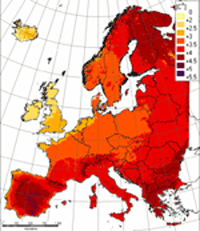
Poor old Europe. Once upon a time it led the global charge on climate change – but these days, it looks rather isolated, what with its public humiliation at Copenhagen (it wasn’t even in the room for the top-level bargaining between Obama and emerging economy leaders) and the fact that it’s pretty much the only developed economy that still wants to see Kyoto extended for another 5 year commitment period.
So how should it play the Durban climate summit at the end of this year? That’s the subject of a new E3G briefing published yesterday, which is worth a read. As Nick Mabey observes in it, the outlook for the summit isn’t altogether encouraging: there’s no political space for a comprehensive, binding deal to limit warming to 2° Celsius; most major emitters will see leadership transitions next year, so no serious debate on raising ambition can start before 2013; and “Europe is characteristically dithering over the choices involved, and is therefore failing to shape the global political and policy environment”.
Europe’s central decision, Nick argues, is whether or not to sign up for Kyoto 2.0 despite the fact that it would be ploughing a lonely furrow in doing so. He makes a persuasive case for it to bite the bullet and do so, arguing that:
– Doing so wouldn’t require Europe to make any additional emissions reductions to those it’s already committed to with its domestic 2020 target (and in any case high global oil prices do a lot of the heavy lifting on emissions reductions even before policymakers lift a finger);
– If Europe did drop Kyoto, it would be seen as the “final climate betrayal” by the developing world; would mean that the EU had wasted €40bn buying international carbon credits; and would leave OPEC and US climate sceptics “sitting in quiet satisfaction at the irony of seeing Europe take the blame for destroying the only legally binding set of global climate rules”; and above all, because
Europe needs Kyoto because it defines the type of climate regime that can actually deliver European security. Europe needs Kyoto because it provides the core around which we can build a coalition of countries to support an effective 2°C climate regime. Europe needs Kyoto because otherwise it walks naked into the negotiating chamber, having thrown away its best levers to bring the US and China into line
Kyoto contains the critical architecture needed to for an effective global climate regime. Kyoto contains all the necessary elements for monitoring, compliance, finance, technical cooperation and economic efficiency. There is no magic institutional structure waiting to be discovered that isn’t already contained inside – or is compatible with – a reformed version of the Kyoto Protocol. The Kyoto architecture took years to negotiate, refine and ratify. There is no time left to start from scratch again. Whatever the often shrill rhetoric from across the Atlantic, the problem many countries have with Kyoto is not because it is flawed, but because it holds them to account in delivering real greenhouse gas emissions reductions.
The only way to constrain global temperatures to around 2°C is through the type of “top down“ structure agreed at Kyoto, where governments negotiate against an overall ambition of emissions reductions and apportion effort to meet a global goal.
I think Nick is a hundred per cent right in this analysis (even though he and I differ about what should happen beyond Kyoto). A top-down approach is essential on climate policy – Nick also notes that “even an optimistic reading of the Copenhagen pledges gives an even chance of exceeding 3.5-4° C by the middle of the century” – and it would be catastrophic if the EU backed away from it now.
The only part of Nick’s argument I’m hesitant about is his suggestion that,
Europe must make its recommitment to Kyoto conditional on participation by key developed countries such as Australia. Major developing countries must signal that they are committed to an evolving regime that eventually binds everyone. If Europe cannot get all of this at Durban it should make its participation in a second commitment period conditional, for example, on a parallel comprehensive agreement being in place by 2015.
In order for that conditionality to be credible, though, other countries must really believe that Europe will be willing to walk if its conditions aren’t met. I wonder whether other countries will judge that Europe has the balls to do that, though: it has never shown such a steely edge in the past, on climate or any other foreign policy issue. And as Nick argues so persuasively in the first part of his paper, Europe needs Kyoto. That’s a point that won’t be lost on other major emitters looking to free ride.
As ever, though, I think it’s shocks – climate impacts, oil and food spikes and others besides – that will change the game and open up political space (see this post on five theories of change on global climate politics). In that sense, it’s essential that at least one major emitter is ready to make use of those shocks when they arise, and say: if the world is now serious about climate change, then this is what it will take to solve it. So even if Europe’s conditionality threat isn’t altogether credible, Nick’s argument is still the right one.



